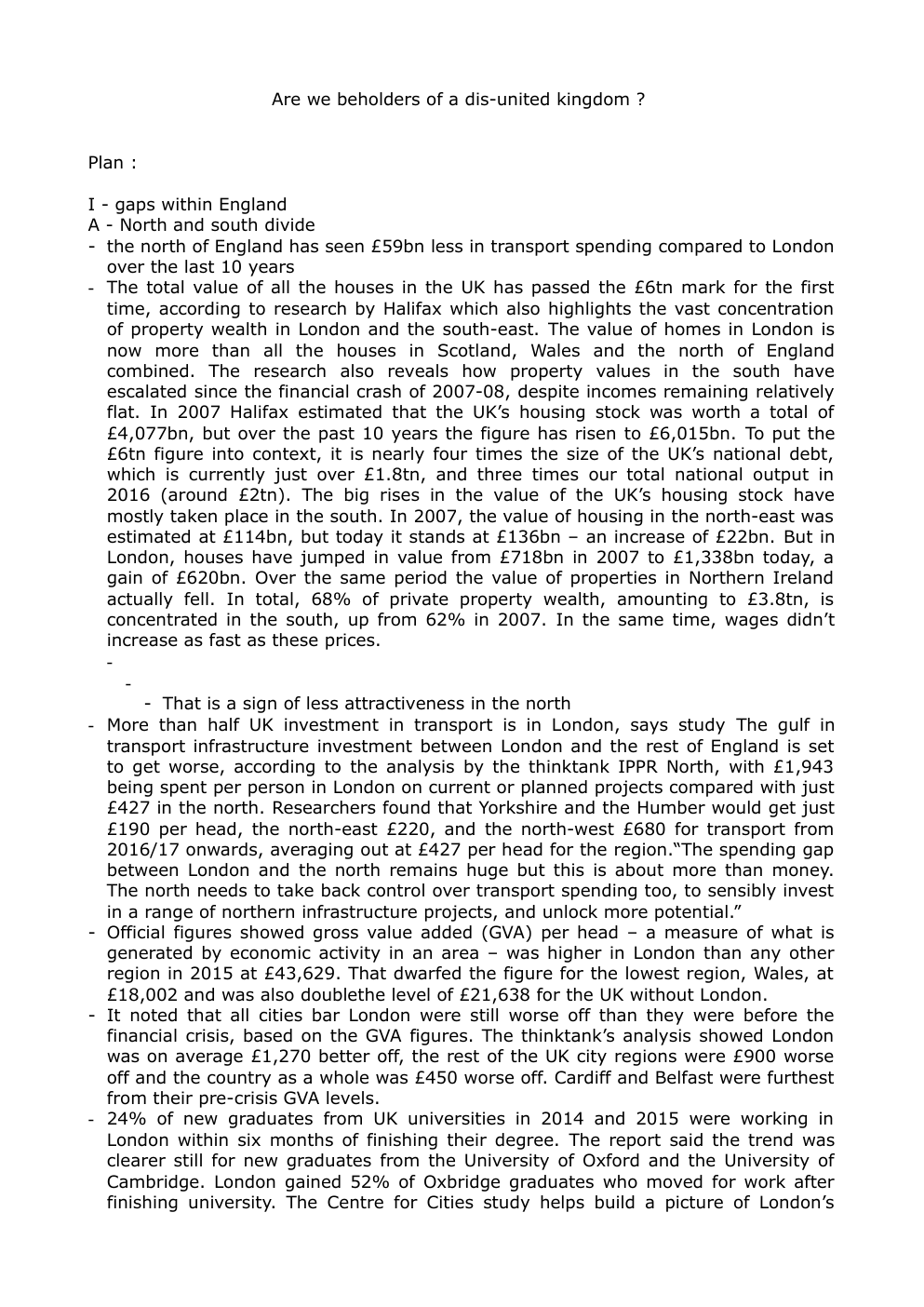Are we beholders of a dis-united kingdom ?
Publié le 07/11/2023
Extrait du document
«
Are we beholders of a dis-united kingdom ?
Plan :
I - gaps within England
A - North and south divide
- the north of England has seen £59bn less in transport spending compared to London
over the last 10 years
- The total value of all the houses in the UK has passed the £6tn mark for the first
time, according to research by Halifax which also highlights the vast concentration
of property wealth in London and the south-east.
The value of homes in London is
now more than all the houses in Scotland, Wales and the north of England
combined.
The research also reveals how property values in the south have
escalated since the financial crash of 2007-08, despite incomes remaining relatively
flat.
In 2007 Halifax estimated that the UK’s housing stock was worth a total of
£4,077bn, but over the past 10 years the figure has risen to £6,015bn.
To put the
£6tn figure into context, it is nearly four times the size of the UK’s national debt,
which is currently just over £1.8tn, and three times our total national output in
2016 (around £2tn).
The big rises in the value of the UK’s housing stock have
mostly taken place in the south.
In 2007, the value of housing in the north-east was
estimated at £114bn, but today it stands at £136bn – an increase of £22bn.
But in
London, houses have jumped in value from £718bn in 2007 to £1,338bn today, a
gain of £620bn.
Over the same period the value of properties in Northern Ireland
actually fell.
In total, 68% of private property wealth, amounting to £3.8tn, is
concentrated in the south, up from 62% in 2007.
In the same time, wages didn’t
increase as fast as these prices.
-
-
- That is a sign of less attractiveness in the north
- More than half UK investment in transport is in London, says study The gulf in
transport infrastructure investment between London and the rest of England is set
to get worse, according to the analysis by the thinktank IPPR North, with £1,943
being spent per person in London on current or planned projects compared with just
£427 in the north.
Researchers found that Yorkshire and the Humber would get just
£190 per head, the north-east £220, and the north-west £680 for transport from
2016/17 onwards, averaging out at £427 per head for the region.“The spending gap
between London and the north remains huge but this is about more than money.
The north needs to take back control over transport spending too, to sensibly invest
in a range of northern infrastructure projects, and unlock more potential.”
- Official figures showed gross value added (GVA) per head – a measure of what is
generated by economic activity in an area – was higher in London than any other
region in 2015 at £43,629.
That dwarfed the figure for the lowest region, Wales, at
£18,002 and was also doublethe level of £21,638 for the UK without London.
- It noted that all cities bar London were still worse off than they were before the
financial crisis, based on the GVA figures.
The thinktank’s analysis showed London
was on average £1,270 better off, the rest of the UK city regions were £900 worse
off and the country as a whole was £450 worse off.
Cardiff and Belfast were furthest
from their pre-crisis GVA levels.
- 24% of new graduates from UK universities in 2014 and 2015 were working in
London within six months of finishing their degree.....
»
↓↓↓ APERÇU DU DOCUMENT ↓↓↓
Liens utiles
- « Et, faisant particulièrement réflexion, en chaque matière, sur ce qui la pouvait rendre suspecte et nous donner occasion de nous méprendre, je déracinais cependant de mon esprit toutes les erreurs qui s'y étaient pu glisser auparavant. » Descartes, Dis
- Qui pense quand je dis "je pense" ?
- Qui suis-je moi qui dis je ?
- Lorsque je dis : « j'ai raison », mon interlocuteur n’a t-il plus qu'à se taire ?
- Qui parle quand je dis "je" ?

































